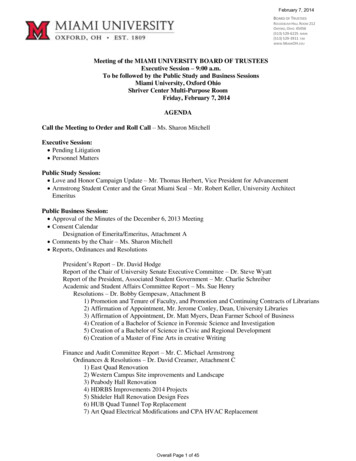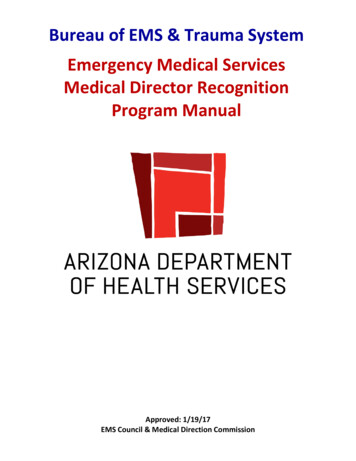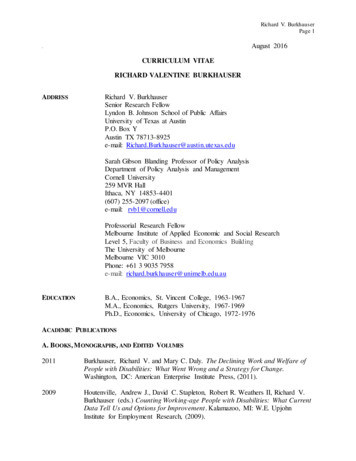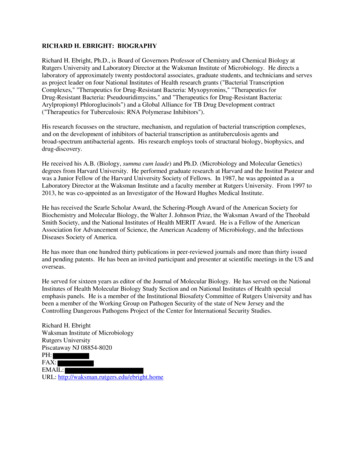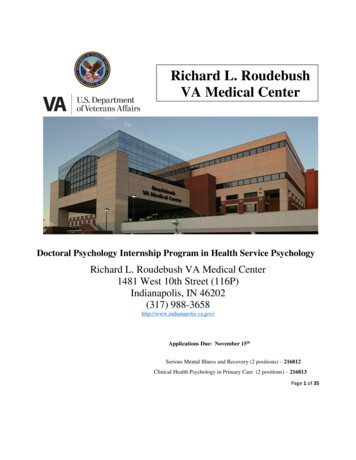
Transcription
Richard L. RoudebushVA Medical CenterDoctoral Psychology Internship Program in Health Service PsychologyRichard L. Roudebush VA Medical Center1481 West 10th Street (116P)Indianapolis, IN 46202(317) s Due: November 15thSerious Mental Illness and Recovery (2 positions) – 216812Clinical Health Psychology in Primary Care (2 positions) – 216813Page 1 of 35
Note: Information in this brochure reflects updates as of 9/1/2020Accreditation StatusThe doctoral internship at the Richard L. Roudebush V.A. Medical Center is a member of the Association of PsychologyPostdoctoral and Internship Centers (APPIC). This program is accredited by the Commission on Accreditation (CoA) ofthe American Psychological Association, effective November 5th, 2013 with the next site visit expected in 2020. Due toongoing COVID-19 pandemic, all site visits have been postponed. Continued accreditation remains in place until anaction is taken by the CoA. For more information or questions please contact CoA at:Office of Program Consultation and AccreditationAmerican Psychological Association750 1st Street, NE, Washington DC 2000Phone: (202) 336-5979/Email:apaaccred@apa.org Web:www.apa.org/ed/accreditationApplication & Selection ProceduresCriteria for acceptance into the programIn accordance with VA policy, our internship seeks applicants who are U.S. citizens and are enrolled in APAaccredited doctoral programs in clinical or counseling psychology. In addition, we require that a prospective intern'suniversity advisor or director of training verify that s/he approves and recommends that the student receive aninternship at this facility, as specified on the APPIC “Academic Program’s Verification of Internship Eligibility andReadiness” form. As an equal opportunity training program, the internship welcomes and strongly encouragesapplications from all qualified candidates, regardless of gender, gender identity, age, religion, race, ethnicity, culture,nationality, socioeconomic status, sexual orientation, disability, or other minority status. We are committed to ensuringa range of diversity among our training classes, and we select candidates representing different kinds of programs andtheoretical orientations, geographic areas, ages, racial and ethnic backgrounds, sexual orientations, disabilities, andlife experiences. All things being equal, consideration is given to applicants who identify themselves as veterans; asmembers of historically underrepresented groups on the basis or racial or ethnic status; as representing diversity basedon sexual orientation; or as representing diversity based on disability status. These factors may be indicated on theirapplication.We also seek candidates who evidence professionalism, scientific mindedness and good interpersonal skills. Inaddition, we look for those who demonstrate strong verbal expressive skills and overall goodness-of-fit withour training program. We are interested in applicants who have obtained a range of clinical experiences butwho are also interested in pursuing a range of ideas as their careers emerge. Applicants should have met theBasic Competency Requirements established by APA for readiness to enter the Internship Program. In addition,we require a minimum of 400 intervention hours, 60 assessment hours and 5 integrated reports. (Note: Werecognize that prospective applicant’s hours may have been impacted by the COVID-19 pandemic and willreview applications with that in mind. Please address any deficits in hours requirements in your cover letter.)Other requirements include: Verification by the intern’s host program DCT of eligibility for participation in the APPIC internshipmatch, which is included in the completed AAPIEnrollment in an APA Accredited clinical or counseling graduate program (Ph.D or Psy.D)Successful completion of comprehensive examinationsGraduate GPA of 3.0 or higherNo evidence of significant professional conduct issuesPage 2 of 35
Completion of academic and practicum requirementsFurther VA internship eligibility requirements:1. U.S. citizenship. VA is unable to consider applications from anyone who is not currently a U.S. citizen.Verification of citizenship is required following selection. All interns and fellows must complete aCertification of Citizenship in the United States prior to beginning VA training.2. A male applicant born after 12/31/1959 must have registered for the draft by age 26 to be eligible for any USgovernment employment, including selection as a paid VA trainee. Male applicants must sign a preappointment Certification Statement for Selective Service Registration before they can be processed into atraining program. Exceptions can be granted only by the US Office of Personnel Management; exceptionsare very rarely granted.3. Interns and Fellows are subject to fingerprinting and background checks. Match result and selectiondecisions are contingent on passing these screens.4. VA training occurs in a health care setting. Some of the patients served by VA are elderly or infirm, andcould succumb to common illnesses like influenza. It is important to be able to document that yourvaccinations are up to date and that you have been screened for active tuberculosis prior to starting yourtraining at VA or other hospitals. Securing a statement from university student health center, your regularhealth provider, or an urgent care clinic can expedite your appointment. Additionally, maintaining a currentflu vaccination during the training year (or taking additional preventative measures to limit patientexposure to the flu) will be required. Please discuss this with the program training director after you havematched and well before to your start date to facilitate your onboarding5. Internship applicants also must meet these criteria to be considered for any VA Psychology InternshipProgram:6. Doctoral student in good standing at an American Psychological Association (APA) or CanadianPsychological Association (CPA) accredited graduate program in Clinical, Counseling, or Combinedpsychology or Psychological Clinical Science Accreditation System (PCSAS) accredited program in ClinicalScience. Persons with a doctorate in another area of psychology who meet the APA or CPA criteria forrespecialization training in Clinical, Counseling, or Combined Psychology are also eligible.7. Approved for internship status by graduate program training director.8. To be eligible for employment as a VA Psychologist, a person must be a U.S. citizen and must havecompleted an APA, or CPA accredited graduate program in Clinical, Counseling, or Combined psychologyor PCSAS accredited Clinical Science program AND must have completed an APA or CPA accreditedinternship in Psychology, with the emphasis area of the degree consistent with the assignment for which theapplicant is to be employed. The only exception is for those who complete a new VA internship that is notyet accredited.Position information: The stipend for the 2021-2022 training year is 26,517.00Only 52-week full-time internships are available (2088 hours).Our anticipated start date is August 1, 2022This setting complies with all APPIC guidelines and with local licensing requirements.APPIC Program Match Numbers:o Serious Mental Illness and Recovery (2 positions) – 216812o Clinical Health Psychology in Primary Care (2 positions) - 216813Application ProcessOur internship program participates in the APPIC match, and application must be made through the online AAPI(APPIC Application for Psychology Internships), which can be found at the APPIC website: www.appic.org/. NoPage 3 of 35
mail or email application materials will be accepted. We request no additional supplemental documents beyondthose indicated on the APPIC website. The deadline for completed applications is November 15th. Interviews willbe arranged for selected applicants (see Candidate Interviews below for more information).Offers of acceptance will be made in agreement with the guidelines developed by the Association of PsychologyPostdoctoral and Internship Centers (APPIC). APPIC Match Policies are available on the APPIC website(http://www.appic.org/). Applicants must obtain an Applicant Agreement from the National Matching Service(http://www.natmatch.com/psychint) and register for the match to be eligible to match to our program. Thisinternship site agrees to abide by the APPIC Policy that no person at this training facility will solicit, accept, oruse any ranking-related information from any intern applicant. We will offer appropriate guidance to all applicantsduring the application process. We strongly suggest that you apply to this program only if it ranks highly in termsof your personal and professional priorities.Prior to beginning the internship year, it will be necessary for applicants selected for the internship trainingprogram to complete an Optional Application for Federal Employment (OF 612) and a Declaration for FederalEmployment (OF 306). Initial drug screen and physicals are mandatory and a part of the on- boarding process.During the training year, interns are responsible for adhering to the policies and procedures of the PsychologyTraining Program and the Psychology Section. Also, many of the laws, rules, and guidelines that apply to federalemployees are applicable to trainees in federal training positions. For example, interns may be subject to randomdrug screening. A copy of the policies and procedures of this training program will be made available to internapplicants during orientation at the beginning of the training year.The application procedure includes the following steps: Complete the on-line APPIC Application for Psychology Internships.Initiate three letters of recommendation from individuals, as part of the Online AAPI.Indicate in your cover letter your major track preferences. Candidates are encouraged to apply to multipletracks.All materials should be received by November 15th.Psychology staff will review all applications and will offer interviews to those who best match with ourprogram and clinical tracks. Preference is given to applicants who have specific training and/or researchexperiences that are consistent with the type of work that is performed at the Roudebush VAMC.Notification of interview status will be sent by December 15th.All correspondence and application materials should be sent to the Training Director:Candace Tomes PsyDPsychology Training DirectorRichard L. Roudebush VA Medical Center1481 W. 10th street (116P)Indianapolis, IN 46202COVID-19 Response and Impact on TrainingThe ongoing COVID-19 pandemic has created numerous challenges. This internship program strives fortransparency in providing detailed information about how our program and training opportunities have been ormay be impacted. This means that we cannot definitively predict how specific rotations may evolve for the 20222023 training year.Page 4 of 35
We can reasonably say that there will be continued utilization of telehealth and technology-based deliveryplatforms. We do not expect that there will be any significant changes to the base clinical services or populationsserved through rotations described in our brochure.The VA campuses have strict restrictions on patients or other members of the public visiting. All employees andvisitors must wear a mask in all public areas on campus as part of our 100% masking policy. Further, employeesmust have their temperature taken upon entering the building. If staff become sick, they can be tested on-site andmust be cleared by Occupational Health before they are allowed to return to campus to work. Most outpatientclinics have resumed face-to-face services. Personal protective equipment (PPE) is available. All didactics andseminars are currently held virtually. When supervision occurs in-person, social distancing and maskingrequirements will be observed.During the pandemic, interns have been offered the opportunity to telework. Staff in some outpatient clinics, areworking a hybrid teleworking/in office schedule. The decision of offering telework opportunities to interns in the2022-2023 cohort will be based on patient care, training needs, federal requirements, and APA accreditationguidelines.Selection and Interview ProcessThe Selection Committee is comprised of the Training Director, at least all major emphasis area supervisors, and otherpsychologists who are members of the Psychology Training Committee. All applications are screened for basiceligibility. Applicants who are deemed to be a good fit with this internship program are invited to interview. Allpersonal interviews are conducted individually and by invitation only. Candidates will be informed via e-mail byDecember 15th as to whether they have been invited for a personal interview. Applicants invited to interview will beinformed about the emphasis area for which they are being considered as applicants are free to apply to more than oneemphasis area. Therefore, applications to more than one emphasis area does not necessarily mean that candidates willbe considered for all areas of interest.Interviews are typically held the second and third Friday of January. Interviews serve as a two-way process: achance for us to meet and learn more about you, and an opportunity for you to meet us and get a betterunderstanding of our program. An interview is required to match with our program. It is not yet determined ifinterviews will be offered in-person. Regardless, virtual interviews are acceptable and will be offered if applicantsare unable to attend the interview days on the second and third Fridays in January.Match ProcessWe will adhere strictly to the match policies established by APPIC. The only information that we maycommunicate to applicants prior to the February deadline is whether they are still under consideration foradmission. Additional information regarding the match is available through the National Matching Services.Psychology SettingThe Richard L. Roudebush VAMC is a Category 1A facility located in the heart of downtown Indianapolis, and itserves veterans from a 45-county area in Indiana and Illinois. The Psychiatry Service employs 46 psychologistsand includes programs representing the entire continuum of mental health services. Our facility is affiliated withthe Indiana University School of Medicine and has participated in training of IU psychology interns. We maintainacademic affiliations with seven APA-approved graduate psychology programs at five different universitiesincluding University of Indianapolis, Indiana University - Purdue University Indianapolis, Ball State University,Indiana State University, Indiana University-Bloomington, and Purdue University.Page 5 of 35
The psychology staff members at our facility are supervised by an executive psychologist who reports to the Chiefof Psychiatry. The psychologists are organized into six groups based on similarity of function, purpose, oractivities. The training program is overseen by Executive Psychology, Shannon Woller, Psy.D, ABPP, and ismanaged by the Training Director, Dr. Candace Tomes.Training Model and Program PhilosophyWe adhere to a practitioner-scholar training model and provide opportunities to engage in numerous clinical,educational, and research activities. The program is designed to develop psychologists who are adept at managing awide range of adult psychological disorders, conducting therapy in multiple modalities (e.g. individual and group),conducting and interpreting psychological and neuropsychological assessments, and providing psychoeducation. Weutilize a mentorship model for both emphasis areas which means that each intern’s primary emphasis area supervisoralso serves as the intern’s mentor. The two primary emphasis areas include: 1)Serious Mental Illness and Recoverywhich focuses on recovery oriented treatment for veterans with serious mental illness and 2) Clinical HealthPsychology in Primary Care which focuses on supporting the primary care provider in identifying and treating mentalhealth concerns. As a site serving primarily adult veterans and some active military service people, the populationserved is predominantly male, although a growing percentage of younger Veterans and active duty service membersare women (approximately 15%). Because we are a general medical and surgical facility rather than aneuropsychiatric facility, several of the training opportunities that we provide have a behavioral medicine or healthpsychology focus.We utilize separate match numbers for each emphasis area, which helps ensure that applicants are guaranteed anexperience in their expressed area of interest. We also flexibly tailor our internship program to meet the trainingneeds of each intern. No differentiation is made between clinical and counseling interns with respect to the contentof their clinical training experiences.Program Aims and ObjectivesThe overall mission of the doctoral psychology internship training program is to provide a high-quality,experiential learning environment from which to cultivate ethical, scientifically grounded, psychologicallyflexible skills, experience, and knowledge that will guide an intern in the transition from graduate student toentry-level professional in the field of psychology. Through a developmental approach, interns will experiencegraduated exposure to increased autonomy as training progresses throughout the year. Specific aims of thetraining program include ensuring interns demonstrate competence in nine key areas including:1.2.3.4.5.6.7.8.9.Individual and Cultural DiversityProfessional Values, Attitudes and BehaviorsEthical and Legal StandardsCommunication and Interpersonal n and Interprofessional/Interdisciplinary SkillsResearchAmong these aims, specific objectives involve the development of foundational and functional competenciesreflecting readiness for entry-level practice. Objectives related to foundational competencies include developingawareness and abilities in reflective practice of self-assessment, scientific knowledge and methods,relationships, individual and cultural diversity, ethical and legal standards and policy, and interdisciplinarysystems. Functional competency objectives include knowledge, skills and abilities in assessment, diagnosis andPage 6 of 35
case conceptualization, intervention, consultation, research and evaluation, supervision and teaching,management and administration, and science and practice. We seek to expose our interns to an array oftreatment settings and therapeutic challenges as they progress through the internship year to accomplish theseobjectives. Interns will learn through graded exposure, based on their individual needs, readiness, and previousexperience. Graduating interns develop the competencies and a sense of professional identity needed for entrylevel positions or post-doctoral residencies. Interns will receive training in shared decision making, thesustenance of long term relationships, and recovery and integration within interdisciplinary collaboration. SeeRequirements for Completion for more information about experiential training objectives.Program StructureWe have four full-time funded internship positions. Interns will complete two six-month major rotations and twosix-month minor rotations while supplementing training with adjunctive training experiences. Interns areguaranteed a rotation in their selected emphasis area and receive mentorship from their emphasis areasupervisor. One primary supervisor will be associated with each major rotation and interns will be assigned amentor who is also the primary supervisor in the intern’s respective area of emphasis. Each intern has one majorand one minor rotation supervisor at any given time, and each rotation supervisor provides one hour ofscheduled individual supervision weekly with additional supervision provided as needed.As interns rotate throughout their year, they maintain a working relationship with their mentor who serves toprovide support and guidance throughout the year. Each supervisor is responsible for selecting patients andmaking referrals, representing psychology with the intern in team meetings, and scheduling individualsupervision and possibly some group supervision sessions as well. One day per week is set aside for trainingactivities including didactics, case presentations, reading, research, and special projects. Interns can expect atleast two hours of individual supervision and two hours of group supervision per week. Additional groupsupervision opportunities take place in the context of interactive didactics, treatment team staff meetings andrelated multidisciplinary meetings. Interns are also expected to gain experience providing supervision and theseopportunities will be available in the intern’s major emphasis area rotations throughout the year. The degree ofresponsibility given the intern and the amount of structure provided depends on the intern’s prior experience.Interns will be formally evaluated at the mid-point and the end of each rotation and upon completion of thetraining year for a total of four evaluations to provide feedback and to cultivate a collaborative effort toward skilladvancement. Interns also provide feedback to the program quarterly for the purposes of program qualityenhancement. At mid-year and the year’s end, interns will meet with the training director individually to discusstraining issues and program quality enhancement in more depth. Please see the Requirements for Completionsection for more information about evaluation processes.Training Schedule and RotationsDuring orientation week, interns meet with training director and their primary mentor to discuss options andpreferences regarding their training schedule for the entire year. Interns then collaboratively establish theirtraining plan with all supervisors who will be involved in their training. The Training Director approves thetraining plan to ensure that it includes experiences that best meet intern individual training needs. Interns areexpected to develop a well-balanced rotation schedule rather than one that is narrowly focused. Interns aregiven considerable latitude in their choice of specific rotations.Interns can expect to participate in 12 hours of training activities weekly. Interns are expected to provide no lessthan an average of 10 hours of direct services per week. Interns will spend approximately 24 hours per weekPage 7 of 35
(three days) in one of three major rotations and approximately eight hours per week (one day) in their chosenminor rotations. Each rotation lasts six months, however involvement in the DBT program through the MHCrequires a year-long commitment.The intern will spend three days per week for one semester in their major emphasis area rotation and the othersix months in the Mental Health Clinic (MHC). To ensure sufficient exposure to the outpatient population, eachintern will be required to complete one major rotation in the MHC. Interns have the ability to choose two minorrotations. For interns who are interested in a year-long experience in their emphasis area, they may opt to haveone minor rotation may be in their emphasis area.Training ExperiencesBelow is a list of the major and minor rotations that are currently available for psychology interns at the Richard L.Roudebush VA Medical Center. The specific program developed by an intern must involve the approval of theDirector of Training.Major Emphasis Area Rotations Serious Mental Illness and Recovery (PRRC) Clinical Health Psychology in Primary Care (PCMHI)Generalist Major Rotations Outpatient Mental Health Clinic (MHC)Minor Rotations Neuropsychology Dialectical Behavioral Therapy (DBT) Trauma Recovery Program LGBT Clinical Research (SMI) Home-Based Primary Care Rehabilitation for Persistent Pain Inpatient Clinical Health Psychology in Primary Care (PCMHI) Serious Mental Illness and Recovery (PRRC)Major EmphasisAreaSMI intern #1Major RotationMinor RotationSMI intern #2Major RotationMinor RotationHealth intern #1Major RotationSemester 1Semester 2SMITBDMHCTBDMHCTBDSMITBDMHCPCMHIPage 8 of 35
Minor RotationHealth intern #2Major RotationMinor RotationTBDTBDPCMHITBDMHCTBDMajor RotationsSerious Mental Illness and RecoverySupervisor: Paul Lysaker, Ph.D., HSPPThis rotation focuses on long term psychotherapy with veterans with significant mental health needs includingthose related to schizophrenia, bipolar disorder, major depression, personality disorders, substance use, andtrauma. Treatment is delivered in the Psychosocial Rehabilitation and Recovery Center (PRRC), an outpatientclinic housing within the lager medical center. The PRRC is made up of an interdisciplinary team includingpsychologists, psychiatrists, nurse practitioners, social workers and graduate level trainees. Group programmingoffers a range of possible experiences, including process groups and social skills training. Patients seen in PRRCengage in group and individual therapy, and family counseling if desired.Many of the patients treated in the PRRC have complex mental health needs which include potentially earlytrauma, social adversity, and multiple comorbid psychiatric and non-psychiatric medical conditions. Thetreatment is individualized and conceptualized as something that develops as the patient and clinician get to knowone another. This rotation offers a strong recovery framework in which meaningful recovery must be directed bythe patient. The clinical work and supervision is based on a metacognitive model of serious mental illness andpersonality disorders (Metacognitive Reflection and Insight Therapy; MERIT) which stresses interventions thatassist clients to utilize integrated ideas about themselves and others to decide how to effectively respond to thepsychosocial challenges posed by psychiatric conditions. It is an integrative and flexible approach in that itdescribes principles that can be adapted by therapists from other perspectives in order to promote metacognitionand help clients meaningfully recover. This work, rather than focusing on the contents of thoughts alone, isinterested in how information is pieced together to form a sense of the larger social world and to decide how tomanage emotional pain. Emphasis will be placed on developing an understanding of barriers to recovery, whichinclude stigma, emotion dysregulation, deficits in social cognition and metacognition, as well as methods used toformally assess these barriers and intervene accordingly.Interns will become able to deliver services to effectively address cognitive and intersubjective processes. Internswill become able to utilize a range of empirically supported techniques based on the unique need of the patient.The intern will also be able to consult and participate in interdisciplinary treatment team meetings with fellowPRRC providers to develop comprehensive psychological conceptualizations to guide treatment planning. Internsmay have the opportunity to offer supervision to practicum students who are providing similar services to adultswith severe mental illness. Interns will become familiar with methods for assessing metacognition and using thatas a framework to guide intervention.Psychology Training Provided: Individual and group psychotherapy, diagnostic and personality assessment, and clinicalresearch.Roles and responsibilities of interns in this rotation include the following: Carrying a caseload of individual psychotherapy patients during the rotation and throughout the training yearFacilitating group psychotherapyProviding psychological assessmentAttending team meetingsPage 9 of 35
Providing staff in-service and educationParticipating in ongoing clinical researchParticipating in supervision of practicum students providing group and individual psychotherapy as well asdiagnostic assessmentPrimary Care Mental Health IntegrationSupervisors: Craig Deken, PhD, HSPP; Allison Rodgers, PhD, HSPP; Sarah Taylor, PsyD, HSPP; Ruth Viehoff, PsyD,HSPPThe purpose of this rotation is to provide interns with an opportunity to provide short-term, solution-focused therapy withVeterans in the Primary Care setting as part of the patient-centered medical home model (known as Patient Aligned CareTeams, or PACT). Interns will spend the majority of their time working as an integrated member of the PACT where theywill support primary care providers in the provision of services to Veterans presenting with mental health (e.g. depression,anxiety, insomnia) and behavioral health (e.g. weight management., tobacco cessation, medication compliance) concernswhile increasing awareness of complex medical needs, including and not limited to diabetes, traumatic brain injury,COPD, chronic pain, and cancer, in patient functioning. Interns will also learn to function as the mental and behavioralhealth subject matter expert on a multidisciplinary team, thus gaining ample experience with interprofessionalcollaboration and consultation.Within the Primary Care Mental Integration Model (PCMHI), the intern will learn how to effectively assess and determinethe appropriate level of care needed for Veterans presenting with mental and behavioral health conditions within theprimary care setting. Interns will learn how and when to refer patients to other levels of care and related programsutilizing the stepped-care model of treatment. Interns will also learn to create a plan of care (POC) via the measurementbased care model, which involves utilizing a brief, standardized assessment and other measures to guide treatmentplanning and assess treatment outcomes while delivering services in one to six 30-minute sessions. Finally, interns willlearn to utilize a broad range of interventions including but not limited to behavioral activation, goal setting, motivationalinterviewing, problem solving, thought challenging, and pleasurable activity planning.
Further VA internship eligibility requirements: 1. U.S. citizenship. VA is unable to consider applications from anyone who is not currently a U.S. citizen. Verification of citizenship is required following selection. All interns and fellows must complete a Certification of Citizenship in the United States prior to beginning VA training. 2.
